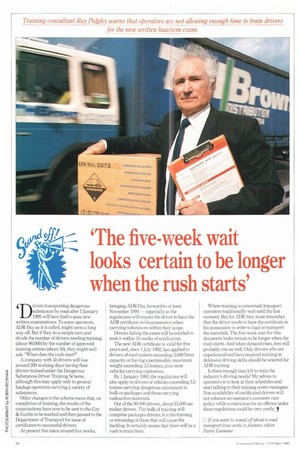4:1 7 'The five-week wait
Page 58

If you've noticed an error in this article please click here to report it so we can fix it.
looks certain to be longer when the rush starts'
4 D rivers transporting dangerous substances by road after 1 January
1995 will have had to pass new written examinations. To some operators, ADR-Day as it is called, might seem a long way off. But if they do a simple sum and divide the number of drivers needing training (about 90,000) by the number of approved training centres (about 50), they might well ask: "When does the rush start?"
A company with 50 drivers will lose around 200 working days having their drivers trained under the Dangerous Substances Driver Training Scheme, although this may apply only to general haulage operators carrying a variety of substances Other changes to the scheme mean that, on completion of training, the results of the examinations have now to he sent to the City & Guilds to be marked and then passed to the Department of Transport for issue of certificates to successful drivers.
At present this takes around five weeks, bringing ADR-Day forward to at least November 1994 — especially as the regulations will require the driver to have the ADR certificate in his possession when carrying substances within their scope.
Drivers failing the exam will be entitled to resit it within 16 weeks of notification.
The new ADR certificate is valid for five years and, since 1 July 1992, has applied to drivers of road tankers exceeding 3,0001itre.s capacity or having a permissible maximum weight exceeding 3.5 tonnes, plus most vehicles carrying explosives.
By 1 January 1995, the regulations will also apply to drivers of vehicles exceeding 3.5 tonnes carrying dangerous substances in bulk or packages and those carrying radioactive materials.
Out of the 90,000 drivers, about 25.000 are tanker drivers. The bulk of training will comprise packages drivers; it is the training or retraining of these that will cause the backlog, it certainly seems that there will be a rush to train them. Where training is concerned, transport operators traditionally wait until the last moment. But for ADR they must remember that the driver needs to have the certificate in his possession in order to load or transport the materials. The five-week wait for this document looks certain to be longer when the rush starts. And when demand rises, fees will probably rise as well. Only drivers who are experienced and have received training in defensive driving skills should be selected for ADR training.
Is there enough time left to train the industry's driving needs? My advice to operators is to look at their schedules and start talking to their training centre managers. Non-availability of certificated drivers will not enhance an operator's customer care policy while a conviction for an offence under these regulations could be very costly.
































































































































